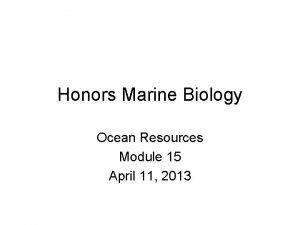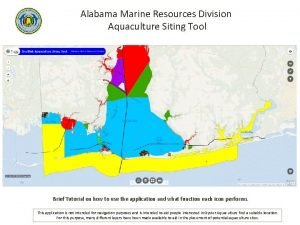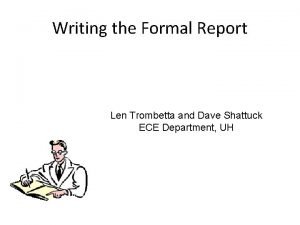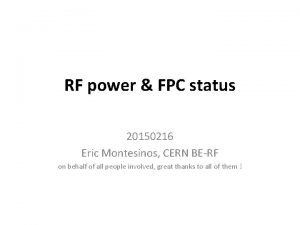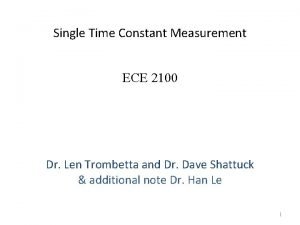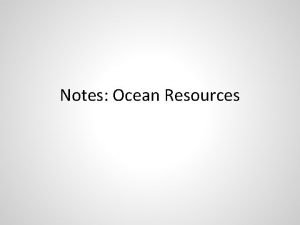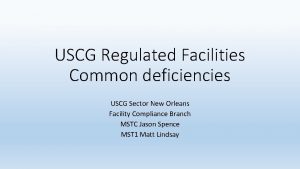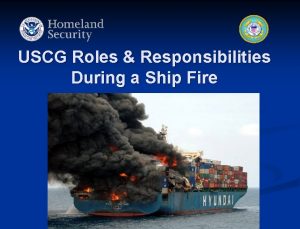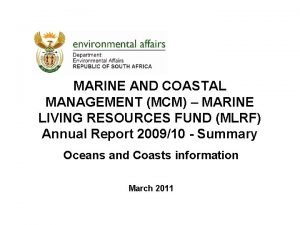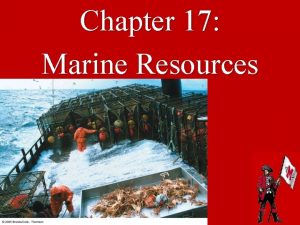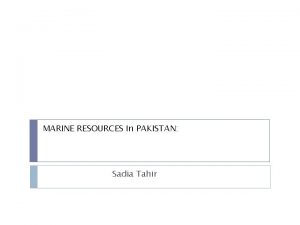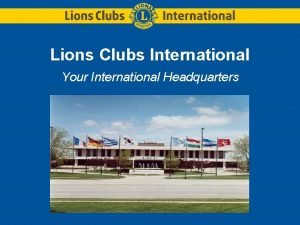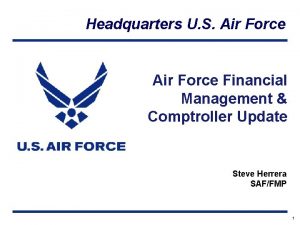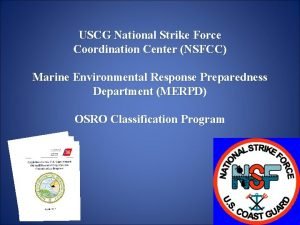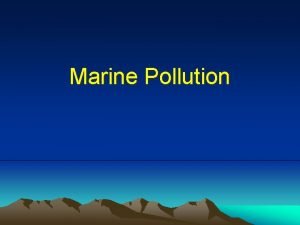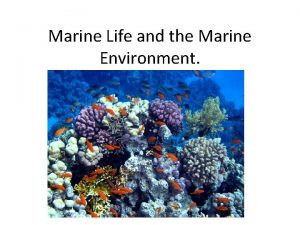USCG Living Marine Resources CGMLE4 USCG Headquarters 2100




















- Slides: 20

USCG Living Marine Resources CG-MLE-4, USCG Headquarters 2100 2 nd Street. S. W. STOP 7363 | Washington, DC 20592 | www. uscg. mil

Program Overview Living Marine Resources Domestic Fisheries Enforcement of Federal fisheries laws and regulations Marine Protected Resources Enforcement and Conservation Protection, assistance and enforcement related to MPR laws and regulations Other Law Enforcement FFV IUU Enforcement Foreign fishing vessel enforcement on high seas or EEZs of partner nations FFV EEZ Enforcement Foreign fishing vessel enforcement on illegal incursions into US EEZ www. uscg. mil 2

LMR Missions

Domestic Fisheries • Includes enforcement of all federal fisheries regulations through the MSFCMA. – Over 140 federally managed fisheries, each with a distinct fisheries management plan governed through RFMCs or regional bodies such as the ASMFC. www. uscg. mil 4

MPR Enforcement and Conservation • Activities to prevent, detect, and suppress violations of the Endangered Species Act, the Marine Mammal Protection Act, the Marine Sanctuaries Act, the Antiquities Act, and other Executive Orders and Federal regulations that protect vulnerable national resources. • This includes surveillance patrols in marine sanctuaries, protection of designated shipwrecks, Manatee speed zone enforcement, and patrols of Stellar Sea-Lion rookeries. • This also includes activities that assist in the conservation and recovery of protected resources such as the transport of marine mammals or endangered species and disentanglement/stranding operations. www. uscg. mil 5

OLE Missions

Threat Areas for EEZ Incursions • US/Mexico border – High amount of lancha activity • US/Canada border – Great Lakes – Canadian gill-netters • US/Russia Maritime Boundary Line – Russian/Korean catcher/processors • Remote Pacific Island EEZs – CNMI (Guam) – Wake Island – Johnston Atoll – Howland & Baker – Palmyra – Jarvis/Kingman Reef www. uscg. mil 7

Illegal, Unreported, and Unregulated (IUU) Fishing IUU boardings include boardings conducted pursuant to bilateral/multilateral fisheries agreements and Regional Fisheries Management Organizations (RFMO). These boardings include all Coast Guard activities in support of RFMOs and in support of bilateral agreements on the high seas and within coastal nation EEZs for the purpose of LMR enforcement. www. uscg. mil 8

Regional Fisheries Management Organizations (RFMOs) • RFMOs are the international bodies that manage fisheries on the high seas. • Western and Central Pacific Fisheries Commission (WCPFC) • Northwest Atlantic Fisheries Organization (NAFO) • North Pacific Anadromous Fisheries Commission (NPAFC) • UN Fish Stocks Agreement • New North Pacific RFMO is awaiting signatures for adoption. www. uscg. mil 9

Bilateral Agreements • Pacific Island Nation bilateral agreements • Federated States of Micronesia, Marshall Islands, Kiribati, Nauru, Tuvalu, Samoa, Palau, Cook Islands, Tonga • AMLEP • Cape Verde, Senegal, The Gambia, Sierra Leone • US/Canada Albacore Agreement • US/PRC Shiprider MOU www. uscg. mil 10

Boarding Policy & Observers

General Policy • Maintaining the integrity of unbiased observer data is top enforcement priority for NOAA OLE and the Coast Guard – Promotes compliance with observer regulations and ensures that observers can effectively and accurately collect and report unbiased data. – Significant violations include failure to carry a required observer, observer harassment, gear tampering, presorting of the catch, or otherwise biasing of samples collected by the observer. www. uscg. mil 12

General Policy (continued) • Boarding Officers may ask observers to assist the boarding team. – (e. g. , provide insight into the vessel’s operations, assist with species identification, and verify the accuracy of the vessel’s logs). www. uscg. mil 13

Interviewing Observers • Observers, when present, are to be discreetly interviewed to ensure they are being allowed to perform their duties. • Reports from observers describing harassment, intimidation, and safety issues are of particular concern. – If an observer provides the boarding team with information that an offense has been committed, the Boarding Officer may use this information to collect evidence on their own of a violation and properly document it. • The Boarding Officer shall exercise significant discretion to ensure the safety of the observer after the departure of the boarding team. www. uscg. mil 14

Observer Safety Inspections • If contacted to help resolve disagreements regarding vessel safety, Coast Guard units shall adhere to the following procedures: – Notify the nearest NOAA OLE enforcement agent and the Coast Guard District CFVS Coordinator, who will assemble appropriate parties and attempt to resolve the dispute; – If the dispute cannot be resolved, a boarding team or commercial fishing vessel examiner may be asked to conduct a dockside boarding of the vessel and report the findings to the CFVS Coordinator. www. uscg. mil 15

Observer Safety Inspections (continued) – NOAA Fisheries, not the Coast Guard, will make the final decision as to what remedial action, if any, the vessel must take in order to meet observer safety requirements; and – If the vessel meets the Coast Guard criteria for voyage termination, then the District Commander shall decide whether voyage termination is appropriate, irrespective of NOAA Fisheries observer safety requirements. www. uscg. mil 16

Difficulty with FV Crews / Requests for Removal • On occasion, observers may have difficulty with the master or crew and request immediate Coast Guard assistance. • In these cases, the Coast Guard should deploy the nearest available unit to assist the observer. • Any decision to remove the observer from the vessel will be made by the District Commander in consultation with NOAA OLE prior to the debarkation of the boarding team. www. uscg. mil 17

Difficulty with FV Crews / Requests for Removal • Units shall notify District when observers report sexual abuse, sexual harassment, assault, request removal from the vessel, or when circumstances exist that prevent the observer from doing his/her job (e. g. , severe seasickness or other medical condition, crew refusal to cooperate with observer). • For reports of sexual abuse, sexual harassment, or assault, the Boarding Officer shall gather facts related to the allegation and seek guidance from District on the appropriate action to take. Such offenses may be prosecutable under the provisions of the MSFCMA. www. uscg. mil 18

MARPOL Violations • MARPOL violations witnessed by observers should be submitted to the National Response Center (NRC) • The NRC is set up to receive any and all reports nationwide, catalogue and retain them, forward notifications to the appropriate Federal, State and Local authorities, etc. • Reports are made online, the website is http: //www. nrc. uscg. mil/ www. uscg. mil 19

Questions? www. uscg. mil 20
 2.15 quiz: marine resources
2.15 quiz: marine resources Alabama marine resources
Alabama marine resources Illorput 2000 type 4
Illorput 2000 type 4 Comp2100
Comp2100 Homework
Homework What is formal report
What is formal report Ece 2100
Ece 2100 Pegasus homepage
Pegasus homepage Eric montesinos
Eric montesinos Genamin kdmp inci
Genamin kdmp inci 2100-2008
2100-2008 Wr2100 waveguide
Wr2100 waveguide Weltbevölkerung
Weltbevölkerung Ece 2100
Ece 2100 Is a burning candle living or nonliving
Is a burning candle living or nonliving Venn diagram of living and nonliving things
Venn diagram of living and nonliving things Living non living dead
Living non living dead The smallest living unit within the human body is
The smallest living unit within the human body is Living resources in the ocean
Living resources in the ocean Social science grade 7 term 1
Social science grade 7 term 1 Differentiate fixed resources and variable resources
Differentiate fixed resources and variable resources
